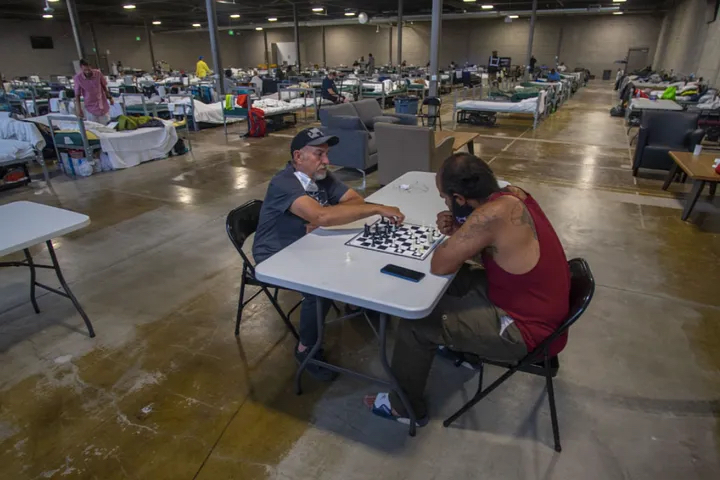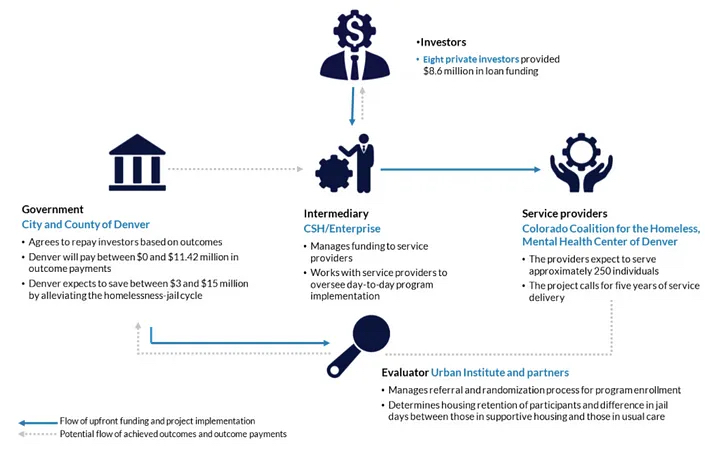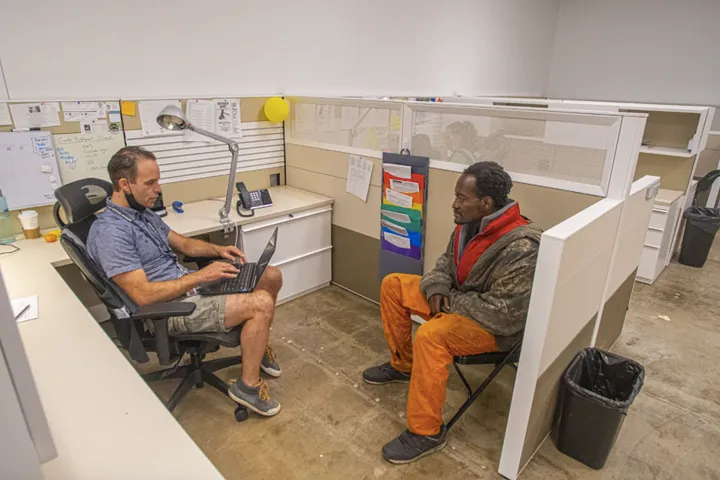Denver, Colorado, USA
How Denver’s Outcomes-Focused Approach to Homelessness Delivered Results.
Project Type:
Finance, Health & Wellness, High-Performing Government, Homelessness
At a Glance
Looked at evidence-supported methods to increase housing stability and decreased incarceration among homeless residents.
Provided real-time data to monitor air quality in Denver schools by using low-cost, cutting-edge air pollution sensor technology, equipped with solar, battery storage, and data connectivity.
Implemented a pay-for-success contracting model that used data to identify outcomes rather than outputs, reaping greater investments for public programs such as housing.
Denver’s Dedication to Results
The United States’ homelessness crisis has only worsened during the pandemic. Local governments searching for innovative and replicable solutions to this persistent challenge should look to Denver, Colorado. In recent years, the City has addressed homelessness through a pay-for-success contracting model that implemented an outcomes-based, Housing First approach.

It all started with a commitment to using data to identify outcomes rather than outputs, says Margaret Danuser, Denver’s deputy chief financial officer. City leaders dug into the city’s homelessness challenges, zeroing in on a particularly costly part of the problem: the homelessness-jail cycle. Without access to housing, many individuals experiencing chronic homelessness become trapped in a cycle that takes them in and out of jail, detoxification centers, or emergency rooms. The cycle makes it nearly impossible for them to find stability or to access the medical care they need. It also comes at a large cost to taxpayers; officials estimated that just a few hundred chronically unhoused people were costing the City $7.3 million each year in public safety and healthcare-related services.
With the aim of breaking this damaging cycle and mitigating costs, the City launched the Supportive Housing Social Impact Bond (SIB) Initiative in 2016. The first step was to identify participants. Using a list of names compiled by the Denver Police Department from arrest, jail, and emergency services records, local service providers walked city streets to find individuals stuck in the homelessness-jail cycle. They identified 250 people. Through partnerships with two key service providers, the Colorado Coalition for the Homeless and the Mental Health Center of Denver, SIB offered these individuals housing and intensive wraparound services to help them get back on their feet. The initiative followed the Housing First approach, which quickly gets people into housing without any preconditions. SIB participants also received a menu of services to help them get identification, medical care, and therapy; reconnect with family members; and access substance abuse treatment.
But what really sets SIB apart is a first-of-its-kind pay-for-success model. The City organized a pool of private SIB investors to commit $8.6 million dollars in upfront funding to pay for wraparound services. It would only pay back the investors if certain outcomes were met. There were two major targeted outcomes: keep SIB participants stably housed for 365 days with no more than 90 days out of housing, and reduce criminal justice involvement among SIB participants.

Developed with support from the Harvard Kennedy School’s Government Performance Lab, an expert partner of What Works Cities (WWC), this pay-for-success contracting method is a stellar example of results-driven contracting, one of the foundational practices of What Works Cities Certification.
“Having that upfront money was a game changer for us. It allowed us to ensure stability for tenants immediately.”
It shifted the risk to the investor group because if the outcomes were not achieved, the City didn’t have to pay.” On the other hand, if outcome goals were exceeded, investors had the opportunity to not only recoup their funds, but receive a return on investment (ROI).
“We wanted to know the true impact of an investment or program, and we wanted to pay for real results.”
A Clear Win-Win
In the end, SIB’s outcomes-focused approach transformed many participants’ lives, far exceeding the initiatives’ goals. An in-depth rigorous evaluation by the Urban Institute tracked outcomes, showing that 86% of people receiving supportive housing remained in their new homes at the end of the first year. After three years, 77% were still stably housed. Participants had a 34% reduction in police interactions, spent 38 fewer days in jail, and experienced a 40% reduction in arrests compared to a control group. Moreover, SIB participants had a 40% decrease in emergency department visits and a 155% increase in office-based visits, where they could receive preventative care.

Having a third-party evaluator has helped build trust between service partners and the City, Danuser says. “It was timely and it gave us a really clear picture of what was going on.” Guided by data detailing desired outcomes, the City made an additional $675,000 in the initiative, expanding SIB midstream in 2018 by an additional 75 participants.
At the program’s conclusion at the end of 2020, the City of Denver had paid investors a total of $9.6 million across five years. The payback encompassed funders’ initial investment of $8.6 million, plus an ROI of $1 million because SIB goals were exceeded. But that was money well spent in two respects, says Stephanie Karayannis Adams, director of Denver’s Budget and Management Office. Hundreds of lives have been transformed through stable housing and better medical and behavioral care. And by helping people get out of the homelessness-hospital/jail cycle, the City avoided millions of dollars in costs associated with that cycle.
“Without SIB, it’s likely that many of the initial 250 participants would have continued to require high levels of public safety and healthcare services. That would have cost the City more than $9.6 million across five years. So to us, this initiative is a clear win-win in terms of people’s lives and public spending.”

Critically, SIB’s strong results illustrated what many homelessness policy experts have long felt to be true: Supportive housing helps people and communities create lasting change. When asked how the program impacted their lives, participants shared how they felt a sense of relief and security for the first time in years. They told stories of decorating their kitchens, rediscovering a love for cooking, hosting family visits, applying for work, and saving money for the future.
With the number of individuals experiencing homelessness growing since the pandemic began, the City of Denver is recommitting to SIB’s successful outcomes-centered strategy. In 2022, it signed a performance-based extension of the Colorado Coalition for the Homeless’ contract to continue providing supportive housing to SIB participants. In addition, the City’s Department of Housing Stability (created in 2019) will oversee a new program funded through the federal Social Impact Partnership to Pay for Results Act (SIPPRA). This permanent program, called Housing to Health, will provide 125 additional individuals with supportive housing and basic health services.
“SIB’s pay-for-success contracting model powered an innovative housing approach that both changes lives and saves money — the data proves that. Now, we’re scaling up the strategy with confidence.”